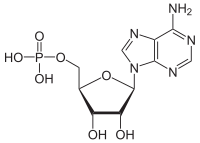
Photo from wikipedia
Adenosine monophosphate–activated protein kinase (AMPK), a serine/threonine protein kinase, is known as “intracellular energy sensor and regulator.” AMPK regulates multiple cellular processes including protein and lipid synthesis, cell proliferation, invasion,… Click to show full abstract
Adenosine monophosphate–activated protein kinase (AMPK), a serine/threonine protein kinase, is known as “intracellular energy sensor and regulator.” AMPK regulates multiple cellular processes including protein and lipid synthesis, cell proliferation, invasion, migration, and apoptosis. Moreover, AMPK plays a key role in the regulation of “Warburg effect” in cancer cells. AMPK activity is down-regulated in most tumor tissues compared with the corresponding adjacent paracancerous or normal tissues, indicating that the decline in AMPK activity is closely associated with the development and progression of cancer. Therefore, understanding the mechanism of AMPK deactivation during cancer progression is of pivotal importance as it may identify AMPK as a valid therapeutic target for cancer treatment. Here, we review the mechanisms by which AMPK is down-regulated in cancer.
Journal Title: Tumor Biology
Year Published: 2017
Link to full text (if available)
Share on Social Media: Sign Up to like & get
recommendations!